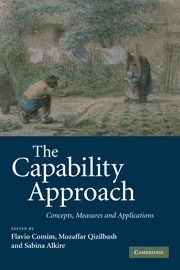Book contents
- Frontmatter
- Contents
- List of figures
- List of tables
- List of contributors
- List of acronyms
- Acknowledgements
- Introduction
- 1 Using the capability approach: prospective and evaluative analyses
- PART I Concepts
- PART II Measures
- 7 Do concepts matter? An empirical investigation of the differences between a capability and a monetary assessment of poverty
- 8 Social exclusion in the EU: a capability-based approach
- 9 Complexity and vagueness in the capability approach: strengths or weaknesses?
- 10 Operationalising Sen's capability approach: the influence of the selected technique
- 11 Operationalizing capabilities in a segmented society: the role of institutions
- PART III Applications
- Index
- References
11 - Operationalizing capabilities in a segmented society: the role of institutions
Published online by Cambridge University Press: 22 September 2009
- Frontmatter
- Contents
- List of figures
- List of tables
- List of contributors
- List of acronyms
- Acknowledgements
- Introduction
- 1 Using the capability approach: prospective and evaluative analyses
- PART I Concepts
- PART II Measures
- 7 Do concepts matter? An empirical investigation of the differences between a capability and a monetary assessment of poverty
- 8 Social exclusion in the EU: a capability-based approach
- 9 Complexity and vagueness in the capability approach: strengths or weaknesses?
- 10 Operationalising Sen's capability approach: the influence of the selected technique
- 11 Operationalizing capabilities in a segmented society: the role of institutions
- PART III Applications
- Index
- References
Summary
Introduction
The world is characterized by the co-existence of excessive opulence and considerable destitution. Some groups have had success in accessing and taking advantage of the opportunities offered by modern economic growth; others have been left behind. It is a well-known fact that societies throughout time have always had this ‘two-tier’ structure of ‘haves’ and ‘have-nots.’ So, the question that arises is this: Is it possible to achieve equality among all groups and among all individuals?
The answer depends in large part on the definition of ‘equality’ and the subsequent question, ‘equality of what?’ (Sen 1980). The one simple truism we accept and value is the heterogeneity of human beings. We all come into this world with different natural attributes as well as social and economic endowments – what we might call intrinsic initial conditions. It is the very differences among individuals that provide the incentives to change, adapt and innovate. However, we also need to ask ourselves whether we are willing to accept a world where individuals starve, die from the lack of drinking water, succumb to diseases which could have been treated with little cost, not have homes to live in or the ability for children to go to school and learn. Can we accept these as just manifestations of our intrinsic conditions or can some form of equality be established which at the same time does not destroy our unique values and attributes that make us all so different?
Information
- Type
- Chapter
- Information
- The Capability ApproachConcepts, Measures and Applications, pp. 362 - 382Publisher: Cambridge University PressPrint publication year: 2008
References
Accessibility standard: Unknown
Why this information is here
This section outlines the accessibility features of this content - including support for screen readers, full keyboard navigation and high-contrast display options. This may not be relevant for you.Accessibility Information
- 6
- Cited by
